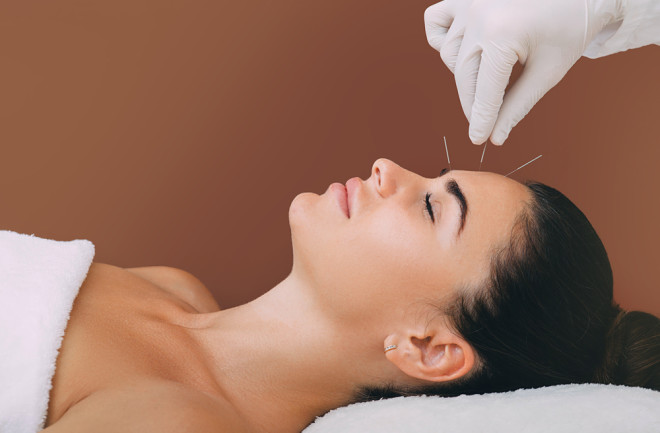Acupuncture is a form of traditional Chinese medicine that has been used for centuries to treat a variety of ailments. It is said to be beneficial for a number of reasons and is claimed to help with pain relief, and stress reduction, and to improve overall health. In this article, we will explore the benefits of acupuncture and how it can be used to improve your health.
What is acupuncture?
Acupuncture is an ancient Chinese medical practice that involves inserting thin needles into specific points on the body to treat a variety of conditions.
How does it work?
There is no one answer to how it works. Its effects are likely due to a combination of factors, including the release of endorphins (the body’s natural painkillers), the stimulation of nerves, and the improvement of blood circulation.
What are the benefits of acupuncture?
In Chinese medicine, illness is believed to be caused by disruptions in the flow of energy (qi), and stimulating certain points along the energy pathways (meridians), can help to restore balance and promote healing.
Acupuncture has been practiced for centuries. The basic premise of acupuncture is that there are certain points on the body that when stimulated can help to alleviate pain and improve overall health.
Pain relief
Acupuncture has been shown to be an effective treatment for pain relief. A recent study published in the Journal of the American Medical Association (JAMA) found that it was more effective than sham for the treatment of chronic pain.
The study included a total of 3,000 participants who were randomly assigned to receive either real or sham. The participants were followed for 12 weeks. The researchers found that those who received real acupuncture had significantly less pain than those who received sham.
Stress relief
Today, it is gaining popularity in the Western world as a treatment for stress and anxiety. Acupuncture works by stimulating the body’s natural ability to heal itself. This helps to release tension and promote relaxation.
A recent study published in the Journal of Alternative and Complementary Medicine found that it can be an effective treatment for stress and anxiety. The study found that participants who received it had lower levels of the stress hormone cortisol than those who did not receive acupuncture.

Other health conditions
Acupuncture can also be used to help treat other health conditions, such as:
- Allergies
- Arthritis
- Asthma
- Back pain
- Depression
- Digestive issues
- Headaches
- High blood pressure
- Insomnia
- Menstrual cramps
- Migraines
- Muscle pain
- Neuropathy
- Stress
What to expect during a treatment?
Before an acupuncture treatment, it is important to consult with a licensed practitioner to discuss your health concerns and goals. During the consultation, the practitioner will ask questions about your medical history and symptoms. They may also perform a physical exam.
Once the consultation is complete, the practitioner will develop a treatment plan. This plan will be based on your individual needs and may involve one or more acupuncture sessions.
During a session, you will lie down on a comfortable table. The practitioner will then insert thin needles only a few millimeters deep into specific points on your body which should not cause any pain.
You may remain still for 20-30 minutes while the needles are in place. Some people feel relaxed during this time, while others may experience mild tingling or warmth at the needle sites.
After removing the needles, you will likely feel refreshed and relaxed. Many people say they feel better after just one session. But to achieve your desired results, multiple sessions may be needed.
Risks associated with acupuncture?
There are a few risks related to acupuncture that are important to be aware of. These include:
- Infection: It can be avoided by making sure the acupuncturist uses sterile needles and cleans the skin properly before inserting the needles.
- Bleeding or bruising: Since needles are used, there is a small risk of bleeding or bruising at the needle site. This is usually not a serious problem and will go away on its own within a few days.
- Dizziness or fainting: Some people may feel dizzy or lightheaded after an acupuncture treatment. This is usually due to the relaxation response that occurs during the treatment and is nothing to worry about. However, if you feel faint or dizzy, make sure to tell your acupuncturist so they can take measures to help you feel more comfortable.
As long as you choose a reputable and experienced acupuncturist, you should have no problems.
How to find a qualified acupuncturist?
If you are considering this kind of treatment as a way to improve your health, it’s important to find a qualified acupuncturist. Here are a few tips:
- Ask your doctor for a referral. If you have a primary care physician or other health care provider that you trust, ask for a recommendation.
- Find a licensed practitioner by the state medical board in order to practice.
- Check credentials. Make sure your acupuncturist has completed an accredited training program and passed a national board exam.
- Ask about experience. Find out how long the practitioner has been in practice and if they have experience treating your specific condition.
- Get a consultation. Schedule a brief consultation with the practitioner to discuss your health concerns and see if acupuncture is right for you.

There are a number of potential benefits of acupuncture, which is why it is becoming increasingly popular as a form of treatment. If you are considering it for yourself, get a consultation with Centric Healthcare, we can provide you with a qualified practitioner to ensure you are getting the most benefit from the treatment. So have you tried acupuncture before? What were your results? Let us know in the comments below!
References:
https://www.hopkinsmedicine.org/health/wellness-and-prevention/acupuncture
https://www.mayoclinic.org/tests-procedures/acupuncture/about/pac-20392763


